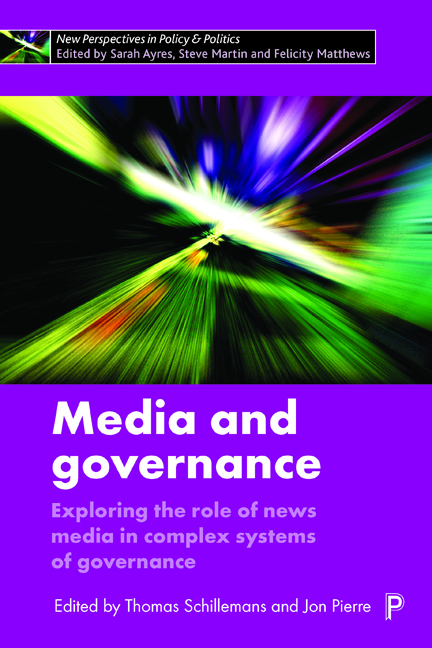Book contents
- Frontmatter
- Contents
- List of figures and tables
- Notes on contributors
- Introduction: Entangling and disentangling governance and the media
- one Governance and the media: exploring the linkages
- two Media and public accountability: typology and research agenda
- three Political control or legitimacy deficit? Bureaucracies’ symbolic responses to bottom-up public pressure
- four Mediatised local government: social media activity and media strategies among local government officials 1989–2010
- five Fighting or fumbling with the beast? The mediatisation of public sector agencies in Australia and the Netherlands
- six The mediatisation of university governance: a theoretical and empirical exploration of some side effects
- seven Managing commercialised media attention in complex governance networks: positive and negative effects on network performance
- eight Over-responsibilised and over-blamed: elected actors in media reporting on network governance. A comparative analysis in eight European metropolitan areas
- Index
six - The mediatisation of university governance: a theoretical and empirical exploration of some side effects
Published online by Cambridge University Press: 19 April 2022
- Frontmatter
- Contents
- List of figures and tables
- Notes on contributors
- Introduction: Entangling and disentangling governance and the media
- one Governance and the media: exploring the linkages
- two Media and public accountability: typology and research agenda
- three Political control or legitimacy deficit? Bureaucracies’ symbolic responses to bottom-up public pressure
- four Mediatised local government: social media activity and media strategies among local government officials 1989–2010
- five Fighting or fumbling with the beast? The mediatisation of public sector agencies in Australia and the Netherlands
- six The mediatisation of university governance: a theoretical and empirical exploration of some side effects
- seven Managing commercialised media attention in complex governance networks: positive and negative effects on network performance
- eight Over-responsibilised and over-blamed: elected actors in media reporting on network governance. A comparative analysis in eight European metropolitan areas
- Index
Summary
Theoretical considerations
Mediatisation of stakeholder relations in a knowledge society
The ‘mediatisation of science’ is a widely acknowledged concept in studies on science communication (for example, Rödder et al, 2012), but it is far less recognised in studies on the governance of higher education institutions (HEI). The mediatisation thesis states that academic institutions and individual scholars are increasingly oriented towards the media and therefore adopt a strategy of becoming visible in the mediated public sphere. The general public, which is represented by mass media, is said to be increasingly significant for legitimising the public funding of academic institutions, a scenario which has repercussions on science itself. The mediatisation of HEI governance has been substantiated in a number of studies (for example, Carvalho, 2007; Peters et al, 2008). For example, universities have increased resources in their communication offices, and obliged their academic staff to contribute to the corporate image in their public appearances (Marcinkowski et al, 2014a, 115–16). Exhaustive survey results have revealed that German HEI attach great importance to being visible in news media. Empirics also point to a particular relevance of higher education policy. The more HEI decision-makers attempt to become visible in mass media, the stronger they perceive politicians to be susceptible to mass media coverage (Marcinkowski et al, 2013, 270–4).
The vision of a ‘knowledge society’ has become increasingly influential in HEI-politics (Vällima and Hoffman, 2008) and bolsters ‘governments’ attempts to make higher education more responsive to a nation's socioeconomic needs’ (Capano, 2011, 1636), since HEI are thought to be ‘destined to play a fundamental role in knowledge societies’ (UNESCO, 2005, 96). The visibility of a HEI in the media can be used as a proxy for its efforts in connecting with a widening spectrum of social actors. In expert-interviews, officers in pending German state authorities report that they would actually make extensive use of this proxy, but unsystematically (Friedrichsmeier and Gohr, 2013, 8–11). However, media coverage lacks the kind of precision that most HEI administrators aspire to obtain from performance measurements. The main goal of recent HEI reforms in various countries can be said to be a ‘rationalising’ of governance (Seeber et al, 2014, 8).
- Type
- Chapter
- Information
- Media and GovernanceExploring the Role of News Media in Complex Systems of Governance, pp. 123 - 144Publisher: Bristol University PressPrint publication year: 2019



